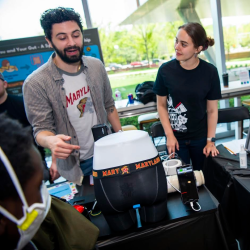Meghan Murphy (B.S. ’15, Biological Sciences) Awarded Fulbright Fellowship to Botswana
Murphy will study the impact of drug and alcohol use on HIV treatment
University of Maryland alumna Meghan Murphy (B.S. ’15, biological sciences) has been awarded a 2017-18 Fulbright Fellowship to conduct research in the southern African country of Botswana, where she will study how drug and alcohol use and addiction impacts HIV patients’ adherence to treatment regimens.
 “The Fulbright will allow me to study HIV treatment, which I became interested in while previously working in Botswana, a country that is a pioneer in HIV care,” Murphy said. “It will also give me the opportunity to study addiction, which is something I’ve always been interested in because I grew up in a family impacted by addiction.”
“The Fulbright will allow me to study HIV treatment, which I became interested in while previously working in Botswana, a country that is a pioneer in HIV care,” Murphy said. “It will also give me the opportunity to study addiction, which is something I’ve always been interested in because I grew up in a family impacted by addiction.”
During her Fulbright, Murphy will work with grassroots organizations and hospitals to collect and analyze data on patients undergoing HIV treatment. She also hopes to develop surveys that incorporate substance use questionnaires to help hospitals better track HIV patients undergoing care and evaluate their adherence to HIV treatment regimens.
Murphy first worked in Botswana in 2015-16 with a Princeton in Africa Fellowship. She interned for six months at the Botswana Ministry of Health, studying HIV drug resistance and treatment failure under Ava Avalos, director of the Careena Centre for Health in Gaborone, the capital of Botswana. Murphy became so interested in the work that she applied for the Fulbright to return to Botswana and continue working with Avalos.
Murphy credits the Alternative Breaks program and other service experiences at UMD with introducing her to global health issues, which led to her earning a minor in global poverty.
“Before I attended Maryland, I knew I wanted to become a doctor,” Murphy said. “But one of my great passions that I developed here on campus was for global health and exploring different cultures. That’s what inspired me to work in Africa, which in turn led to the Fulbright.”
On campus, Murphy studied neurobiology in the laboratory of Associate Professor of Psychology Jens Herberholz, with whom she completed her Honors Program thesis. In Herberholz’s laboratory, Murphy investigated the effects of different neurochemicals on behavior and decision-making in crayfish. In 2014, Murphy presented her work at the Society for Neuroscience’s annual meeting.
“Working in Dr. Herberholz’s lab, I gained an understanding of the importance of neural mechanisms in behavior and how such mechanisms can help us better understand addiction and mental illness,” Murphy said. “That drove me to continuously explore addiction and attempt to understand it on many different levels.”
After her Fulbright year, Murphy plans to pursue a medicine and public health dual degree program that will allow her to combine practicing medicine with meeting the needs of underserved communities.
“At Maryland, I’ve learned that public health care can really inform clinical practice and target populations that are often overlooked,” Murphy said. “That’s why in the future, I want to focus my work and my practice on serving those communities, both in the U.S. and abroad.”
###
Media Relations Contact: Irene Ying, 301-405-5204, zying@umd.edu
University of Maryland
College of Computer, Mathematical, and Natural Sciences
2300 Symons Hall
College Park, MD 20742
www.cmns.umd.edu
@UMDscience
About the College of Computer, Mathematical, and Natural Sciences
The College of Computer, Mathematical, and Natural Sciences at the University of Maryland educates more than 7,000 future scientific leaders in its undergraduate and graduate programs each year. The college’s 10 departments and more than a dozen interdisciplinary research centers foster scientific discovery with annual sponsored research funding exceeding $150 million.







